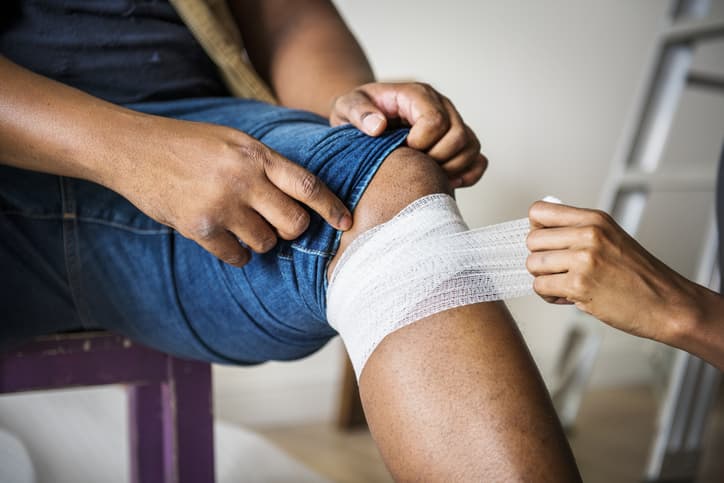When it comes to minor cuts, scrapes, or burns, proper wound care is essential to prevent infections and promote faster healing. Many people in Dubai hesitate to handle wound dressing at home, fearing they might do it wrong. However, with the right knowledge and supplies, you can confidently manage minor wounds without always needing professional help. Learning Wound Dressing at home Dubai is easier than you think, and this guide will walk you through everything you need to know.
Why Wound Dressing at Home in Dubai is a Smart Choice
Living in a bustling city like Dubai means convenience is key. Whether you’re at home, work, or traveling, knowing how to dress a wound properly can save you time and unnecessary trips to a medical facility. Minor injuries happen frequently—a small kitchen cut, a scraped knee, or a minor burn while cooking. Instead of panicking, having the skills to perform wound dressing at home in Dubai ensures quick and effective care.
Additionally, Dubai’s warm climate can sometimes increase the risk of infections if wounds are left exposed. Proper wound dressing keeps the area clean, protected, and allows for optimal healing. By mastering this simple yet crucial skill, you become more self-reliant in handling everyday injuries.
Essential Supplies for Wound Dressing at Home in Dubai
Before you begin, it’s important to have the right supplies on hand. A well-stocked first-aid kit makes wound dressing at home in Dubai much smoother. Here’s what you should have:
Clean Gloves and Antiseptic Solution
Always start by washing your hands thoroughly and wearing clean gloves to avoid introducing bacteria to the wound. An antiseptic solution like saline or mild soapy water helps clean the area gently without causing irritation.
Sterile Gauze and Bandages
Sterile gauze pads are perfect for covering wounds as they absorb fluids while allowing the skin to breathe. Depending on the wound size, adhesive bandages or medical tape can secure the dressing in place.
Antibiotic Ointment
A thin layer of antibiotic ointment can prevent infections and keep the wound moist, which promotes faster healing. However, avoid overusing it, as some wounds heal better when left dry.
Scissors and Tweezers
A pair of clean scissors helps trim bandages to the right size, while tweezers can be useful for removing any debris from the wound before dressing.
Step-by-Step Guide to Proper Wound Dressing at Home in Dubai
Now that you have your supplies ready, let’s go through the proper steps for wound dressing at home in Dubai.
Clean the Wound Gently
Start by rinsing the wound under cool running water to remove dirt and bacteria. Avoid using harsh substances like hydrogen peroxide, as they can damage healthy tissue. Instead, use a mild antiseptic solution to cleanse the area.
Apply Antibiotic Ointment if Needed
For minor cuts and scrapes, a small amount of antibiotic ointment can help prevent infection. However, if the wound is deep or bleeding heavily, it’s best to seek professional medical attention.
Cover with a Sterile Dressing
Place a sterile gauze pad over the wound and secure it with medical tape or a bandage. Make sure the dressing is snug but not too tight, as proper circulation is important for healing.
Change the Dressing Regularly
Check the wound daily and change the dressing if it becomes wet, dirty, or starts to loosen. Keeping the wound clean and dry is crucial for preventing infections, especially in Dubai’s humid weather.
When to Seek Professional Help
While wound dressing at home in Dubai is effective for minor injuries, some situations require medical attention. If the wound is deep, won’t stop bleeding, shows signs of infection (redness, swelling, pus), or was caused by a rusty object, consult a healthcare provider immediately. Additionally, individuals with diabetes or weakened immune systems should be extra cautious with wound care.
Tips for Faster Healing
To ensure your wound heals as quickly as possible, follow these simple tips:
Keep the Wound Moist but Not Wet
A moist environment helps cells regenerate faster, but excessive moisture can lead to infections. Change dressings whenever they become damp.
Avoid Picking at Scabs
Scabs are nature’s bandage—picking at them can reopen the wound and delay healing. Let them fall off naturally.
Eat a Balanced Diet
Nutrients like vitamin C, zinc, and protein play a vital role in skin repair. Incorporate fruits, vegetables, and lean proteins into your meals to support healing.
Final Thoughts
Learning Wound Dressing at home in Dubai is a practical skill that empowers you to handle minor injuries confidently. With the right supplies and techniques, you can ensure proper care without unnecessary stress. Remember, while home wound care is great for small cuts and scrapes, never hesitate to seek professional help for more serious injuries.






Comments